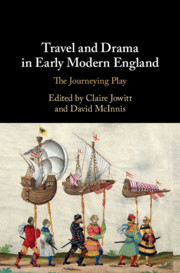Book contents
- Travel and Drama in Early Modern England
- Travel and Drama in Early Modern England
- Copyright page
- Contents
- Figure
- Contributors
- Acknowledgements
- Introduction: Understanding the Early Modern Journeying Play
- Chapter 1 ‘For his Travailes let the Globe witnesse’: Venturing on the Stage in Early Modern England
- Chapter 2 Seeing and Overseeing the Stage as Map in Early Modern Drama
- Chapter 3 Marlowe's Mediterranean and Counter-Epic Forms of Oceanic Hybridity
- Chapter 4 Making the Land Known: Henry IV, Parts 1 and 2 and the Literature of Perambulation
- Chapter 5 Eastward Ho and the Traffic of the Stage
- Chapter 6 Language and Seafaring in Thomas Middleton and John Webster's Anything for a Quiet Life
- Chapter 7 Rogue Cosmopolitans on the Early Modern Stage:
- Chapter 8 Drama at Sea: A New Look at Shakespeare on the Dragon, 1607-08
- Chapter 9 Strange Bedfellows: The Ordinary Undersides of ‘A True Reportory’ and The Tempest
- Chapter 10 Travelling Characters in Early Modern Drama
- Chapter 11 ‘Constant Changelings’, Theatrical Form, and Migration: Stage Travel in the Early 1620s
- Chapter 12 The Uses of Cultural Encounter in Sir William Davenant's Caroline-to-Restoration Voyage Drama
- Bibliography
- Index
- References
Bibliography
Published online by Cambridge University Press: 21 September 2018
- Travel and Drama in Early Modern England
- Travel and Drama in Early Modern England
- Copyright page
- Contents
- Figure
- Contributors
- Acknowledgements
- Introduction: Understanding the Early Modern Journeying Play
- Chapter 1 ‘For his Travailes let the Globe witnesse’: Venturing on the Stage in Early Modern England
- Chapter 2 Seeing and Overseeing the Stage as Map in Early Modern Drama
- Chapter 3 Marlowe's Mediterranean and Counter-Epic Forms of Oceanic Hybridity
- Chapter 4 Making the Land Known: Henry IV, Parts 1 and 2 and the Literature of Perambulation
- Chapter 5 Eastward Ho and the Traffic of the Stage
- Chapter 6 Language and Seafaring in Thomas Middleton and John Webster's Anything for a Quiet Life
- Chapter 7 Rogue Cosmopolitans on the Early Modern Stage:
- Chapter 8 Drama at Sea: A New Look at Shakespeare on the Dragon, 1607-08
- Chapter 9 Strange Bedfellows: The Ordinary Undersides of ‘A True Reportory’ and The Tempest
- Chapter 10 Travelling Characters in Early Modern Drama
- Chapter 11 ‘Constant Changelings’, Theatrical Form, and Migration: Stage Travel in the Early 1620s
- Chapter 12 The Uses of Cultural Encounter in Sir William Davenant's Caroline-to-Restoration Voyage Drama
- Bibliography
- Index
- References
- Type
- Chapter
- Information
- Travel and Drama in Early Modern EnglandThe Journeying Play, pp. 251 - 260Publisher: Cambridge University PressPrint publication year: 2018

